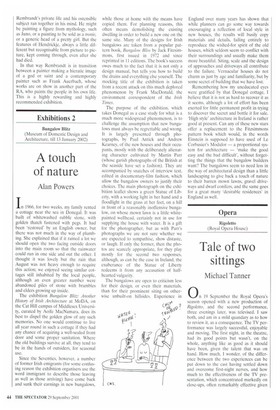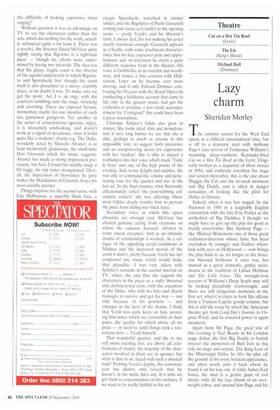Tale of two sittings
Michael Tanner
On 19 September the Royal Opera's season opened with a new production of Rigoletto, and the second performance, three evenings later, was televised. I saw both, and am in a mild quandary as to how to review it, as a consequence. The TV performance was largely successful, enjoyable and moving. The first night, in the theatre, had its good points but wasn't, on the whole, anything like as good as it should have been, given the talent that was on hand. How much. I wonder, of the difference between the two experiences can be put down to the cast having settled down and overcome first-night nerves, and how much to the effectiveness of the TV presentation, which concentrated markedly on close-ups, often remarkably effective given
the difficulty of looking expressive when singing?
Without question it was an advantage on TV to see the characters rather than the sets, which did nothing for the work, actually subtracted quite a lot from it. There was a revolve, the director David McVicar quite rightly saying that Rigoletto is a tight-knit piece — though his efforts were undermined by having two intervals. The idea was that the glassy, fragile court is the obverse of the squalid underworld in which Rigoletto and Sparafucile live; though the court itself is also presented as a messy, crumbly place, as no doubt it was. To make sure we get the point, Act I is an orgy, with the courtiers tumbling onto the stage, shrieking and cavorting. There are exposed breasts, momentary nudity for one member of each sex, pansexual goings-on. Yet another in the series of conscientious operatic orgies, it is tiresomely unshocking, and doesn't work as a signal of decadence, since it looks quite like a students' charity rag. The Duke, woodenly acted by Marcelo Alvarez, is at least moderately glamorous, the small-time Don Giovanni which his music suggests. Alvarez has made a strong impression previously, but here I found his middle range a bit foggy, his top notes strangulated. Overall, the impression of blowsiness he gave makes the Maddalena of Graciela Araya his most suitable partner.
Things improve for the second scene, with Eric Halfvarson. a superbly black bass, a creepy Sparafucile, wreathed in sinister smiles, and the Rigoletto of Paolo Gavanelli coming into focus as it hadn't in the opening scene — partly Verdi's and his librettist's fault, I always feel, for not making his jester nearly venomous enough. Gavanelli appears as a beetle, with some arachnean characteristics; but his face expresses pain and apprehension, and on television he elicits a quite different response from in the theatre. His voice is Gobbi-like in its warmth and woolliness, and makes a fine contrast with Halfvarson. Later on he became ever more moving, and if only Edward Downes, celebrating his 50 years with the Royal Opera by conducting a lacklustre account that came to life only in the quieter music, had got the orchestra to produce a less timid accompaniment for 'Cortigiani!' this could have been a great assumption.
Christine Schafer's Gilda also grew in stature. She looks ideal, slim and tremulous, and it isn't long before we see that she is able, perhaps as much as anyone in this impossible role, to suggest both innocence and an overpowering desire for experience with her 'student'. She is able to impart a wistfulness into her voice which made 'Tune le feste' into one of the high points of the evening. And, to my delight and surprise, she was able to command the volume and penetrating tone for the quartet and trio in the last act. In the final minutes, what Stravinsky affectionately called 'the post-stabbing coloratura concert' she was affecting where most Gildas clearly wonder how to prevent the piece from sliding into black farce.
Secondary roles, in which this opera abounds, are strongly cast. McVicar has elicited genuine acting from everyone on whom the cameras focused, Alvarez to some extent excepted. And as an intimate drama of relationships it worked. As a critique of the appalling social conditions in Mantua and the depraved morals of the court it didn't, partly because Verdi has not composed any music which would make that plausible. I was very taken with Schafer's remarks in the second interval on TV, where she said that she regards the characters in the piece as a sadly thwarted and dysfunctional crew, with the exception of the Duke, who with his brio and charm manages to survive and get his way — not only because of his position — and emerges as the hero of the drama. I think that Verdi was quite keen on him, awarding him tunes which are irresistible in their gusto, the quality for which above all we prize — or used to, until things took a tooserious turn — Verdi himself.
That wonderful quartet, and the to me still more exciting trio, are above all celebrations of vitality; the majority of the characters involved in them are in agonies, but what is that to us, faced with such a musical rush? Probing Verdi's depths, the centenary year has shown, only reveals that he doesn't, in the main, have any. It is time we got back to concentration on his surfaces, if we want to be really faithful to his art,







































































 Previous page
Previous page